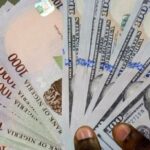Industries in the country are battling for survival owing to the continued slide of the naira against the dollar, Daily Trust can report.
The naira Thursday traded at between N1,150 and N1,155/dollar at the unregulated markets in Lagos and Abuja.
At the official Investors & Exporters (I&E Window), it had earlier traded at N986 before closing at N782.68.
The organised private sector and other stakeholders said as the naira weakened further, manufacturers and business owners were faced with severe challenges of increased import costs, high inflationary pressure, reduced profit margins and limited access to foreign markets.
- Kano tops as 15,060 suspected cases of diphtheria hit 20 states, FCT
- N60m up for grabs in Betsy Obaseki tourney as draws hold today
The Director-General, Nigeria Employers’ Consultative Association (NECA), Adewale-Smatt Oyerinde, told Daily Trust that the naira’s slide had hindered industry and business capacity utilisation, production, employment, sales and profits.
He stated, “The implication of the trend is grave for the economy and private businesses. The major impacts are that the working capital of private sector businesses and the real income of Nigerians have both shrunk due to high inflation, a precarious situation for the private sector businesses.”
He advised government to return exchange rate management to a guided float regime where the government could support the naira with complementary policy to maintain stability against the imminent collapse of the currency and its negative impact on the private sector.
“The journey to a capitalistic state is audacious and gradual. More so, no economy is totally capitalistic. In the context of exchange rate management, the government should maintain a healthy balance between control and floating to circumvent the looming monetary collapse. Fortunately, the IMF or World Bank do not compel countries to totally float their exchange rate. It’s discretionary.
“In the context of the unification policy, as the CBN increases its intervention in the official window, the government may need to take an audit of registered BDCs, distribute them among the commercial banks and place their forex allocations with the host commercial banks. The BDCs then get forex allocations and submit reports of disbursement to the commercial banks. In this way, it’s easy to narrow the official market rate and the BDC rate.
“To complement the measure, non-registered BDCs or black market operators would need to be subjected to punitive actions,” he said.
The Director-General, Nigerian Textile Manufacturers Association, Hamma Kwajaffa, in a chat with Daily Trust, said many companies were forced to fold up while others were reducing their workforce to stay afloat.
He said the naira’s depreciation had made the business environment hostile to many manufacturers and business owners who were forced to source forex at the black market.
“It’s a fact that many companies are folding up. Government claims to be relying on the private sector to create jobs, but companies are retrenching because every employer must learn how to at least break even and then, with some profits. Local manufacturers can’t produce and export at this rate.
“Companies are leaving Nigeria, moving to Ghana. We’re not encouraging local production, but we’re going about begging investors who won’t come because the environment is not good.
“Without the right infrastructure, Nigeria will become a dumping ground with the implementation of the African Continental Free Trade Area (AfCFTA) if we’re unable to be competitive,” he warned.
He also said the reversal of the FX ban on 43 items by the Central Bank of Nigeria came at the wrong time.
“Government needs to look at the manufacturers. We’re making it easier for people to import into the country. We need to work on exports; how to process our raw materials. Look at tomatoes, they’re being wasted because we don’t have enough storage facilities in the country. It is the same for other raw materials,” he said.
The President, Nigerian Association of Chambers of Commerce, Industry, Mines and Agriculture (NACCIMA), Dele Oye, said though the government was implementing policies, such as foreign exchange management, securing foreign loans to mitigate the current negative gap in foreign currency for Nigerians, export promotion initiatives, support for local industries, and infrastructure development, it should do more by “capitalising the current gains from the reduced subsidy on petroleum, investing part of the income in development banks and issuing an executive order to promote availability of single-digit medium and long-term loans to ease access to capital.”
Meanwhile, some entrepreneurs told the Daily Trust that the continued slide of the naira had made it difficult for them to remain in business.
A business woman, who deals in imported fabrics, Rayo Ajibola, noted that as of yesterday, a dollar was quoted to her at N1,200. “Our products are now expensive because we sell in line with the dollar rate. It has been very tough recently because the rate changes every day.”
Phone dealers also said the naira’s free fall had affected the prices of mobile phones and computer systems.
A former president of the Computer and Allied Products Dealers Association of Nigeria, Ahmed Ojikutu said, “A system sold as at May 26 for N515,000 is sold for N680,000 today.”
How to strengthen naira – Former minister
A former Minister of Finance, Olusegun Aganga, said the naira would continue to be weak if Nigeria remains an import-dependent country and does not produce for local consumption and more importantly for export.
Aganga, who spoke in Lagos at the 3rd Adeola Odutola, lecture during the 51st Annual General Meeting of the Manufacturers Association of Nigeria, asked: “What is the wisdom in spending billions defending the naira when it continues to fall instead of investing in genuine manufacturers and exporters of high-value products that would earn Nigeria foreign income and more.”
He charged the government to declare the industrial sector a national priority sector and back it with plans, policies and money.
“Unlike the trillions spent on subsidies, bailouts, the Agric Anchor Borrowers Programme, the refineries, I can assure you that every naira, no matter how large, that is well spent on the strategic industrial sectors can be easily recovered and will deliver tremendous benefits to the economy and the nation.”
The Partner, Deal Advisory, KPMG Nigeria, Dolapo Adeosun, said the backlog of forex exchange obligations is a disincentive to investors.
Forex backlog, which is the unmet demand for forex by investors and exporters, is estimated at $10bn and has resulted in huge losses by many firms, according to market players.
Adeosun urged the government to clear the backlogs to encourage investors.
BDC operators suggest way out
The President, Association of Bureau De Change Operators of Nigeria, Aminu Gwadabe, said achieving stable, strong and virile exchange rate would require full participation of BDCs in the retail segment of the forex exchange market.
He said the “illiquidity in the market” remained a major concern to the BDCs.
“We, at ABCON advise that BDCs should be allowed to access dollars or diaspora remittances through the autonomous forex windows like allowing operators to receive IMTOs proceeds, carrying out online dollar operations and Point of Sale (PoS) agency, among others,” he said.
‘One-way flight ticket may hit N130,000’
The Managing Director, Aero Contractors, Ado Sanusi, said with the current rate of exchange, a one-way ticket should sell for over N130,000.
He said, “As the dollar is rising, you can quote me on this. When the dollar was N460, we were selling a Lagos-Abuja ticket at N65,000. The dollar now is twice and there’s nothing we do in aviation that is not dollarised. You can imagine. So, we should be selling the ticket at N130,000.
“It’s in the interest of even the regulator to see whether tickets are sold comparatively to what the dollar is. A one-hour flight should sell for between $150 to $200.
“We don’t manufacture the aircraft; we don’t even refine the oil. So what else do you do? Even the wheel on an aircraft, we don’t do it. The only thing we can control is manpower.
“The moment the dollar is rising, even the bolts on the aircraft, we have to buy from outside the country. The fuel we’re going to buy is imported, the parts we’re going to buy are imported,” he stated.

 Join Daily Trust WhatsApp Community For Quick Access To News and Happenings Around You.
Join Daily Trust WhatsApp Community For Quick Access To News and Happenings Around You.


